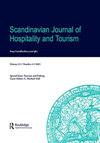挪威徒步旅行协会:以新的旅游模式继续存在的条件。
IF 3.1
4区 管理学
Q2 HOSPITALITY, LEISURE, SPORT & TOURISM
Scandinavian Journal of Hospitality and Tourism
Pub Date : 2021-04-08
DOI:10.1080/15022250.2021.1913219
引用次数: 5
摘要
挪威徒步协会(DNT)在挪威各地推广户外活动。它在全国各地标记了小径,并经营着550个小屋,由广泛的自愿努力维护。本文以挪威一个实施DNT的地区为例,讨论了DNT系统得以维持的先决条件,以及它在新的旅游模式下面临的挑战。两个主要条件对DNT系统的发展至关重要。首先,DNT的核心价值和它的来宾之间需要有很大的重叠。其次,系统中固有的规范和行为的转移受到实时和地点的社会接触、身体体验的制约,并受到同伴之间面对面交流的促进。不熟悉DNT系统核心价值观和行为准则的客人可能会威胁到系统;在信息材料和指导新人的导师中增加宣传核心价值的注意力可能会抵消这些威胁。本文章由计算机程序翻译,如有差异,请以英文原文为准。
The Norwegian trekking association: conditions for its continued existence with new tourism patterns.
ABSTRACT The Norwegian Trekking Association (DNT) promotes outdoor activities all over Norway. It marks trails and operates 550 cabins, maintained by extensive voluntary efforts, throughout the country. Based on a case study of one area in Norway in which DNT operates, we discuss the prerequisites for the DNT system to be sustained and the challenges it faces with new tourism patterns. Two main conditions are paramount for the DNT system to develop. First, a large overlap between the core values of DNT and its guests is required. Second, the transfer of norms and conduct inherent in the system is conditioned by social encounters in real time and places, bodily experiences, and facilitated by face-to-face communication between fellow trekkers. Guests who are unfamiliar with the DNT system’s core values and code of conduct may threaten the system; increased attention to promoting the core values in informational material and mentors who guide newcomers may counteract these threats.
求助全文
通过发布文献求助,成功后即可免费获取论文全文。
去求助
来源期刊
CiteScore
7.90
自引率
8.30%
发文量
14
期刊介绍:
Scandinavian Journal of Hospitality and Tourism is the leading Nordic journal for hospitality and tourism research. SJHT aims at initiating and stimulating high-impact and innovative research relevant for academics and practitioners within the hospitality and tourism industries. The journal takes an interdisciplinary approach including, but not limited to geography, psychology, sociology, history, anthropology, and economics. SJHT encourages research based on a variety of methods, including both qualitative and quantitative approaches. The journal covers all types of articles relevant to the Nordic region, as well as the North Atlantic, North Sea and Baltic regions. We also welcome reviews and conceptual articles with a broader geographical scope that clearly enhance the theoretical development of the hospitality and tourism field. In addition to research articles, we welcome research notes and book reviews. Published articles are the result of anonymous reviews by at least two referees chosen by the editors for their specialist knowledge.

 求助内容:
求助内容: 应助结果提醒方式:
应助结果提醒方式:


